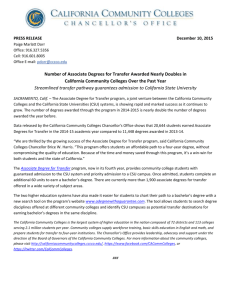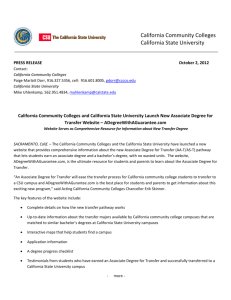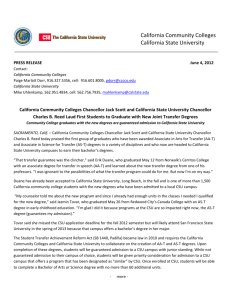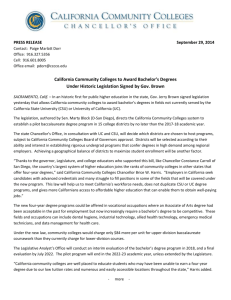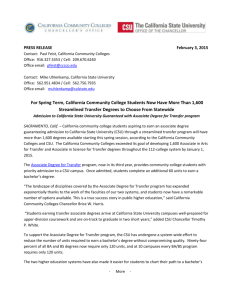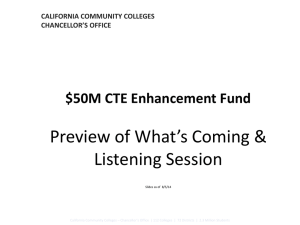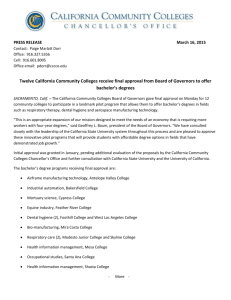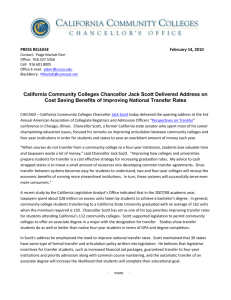PRESS RELEASE July 20, 2011 Contact: Paige Marlatt Dorr
advertisement
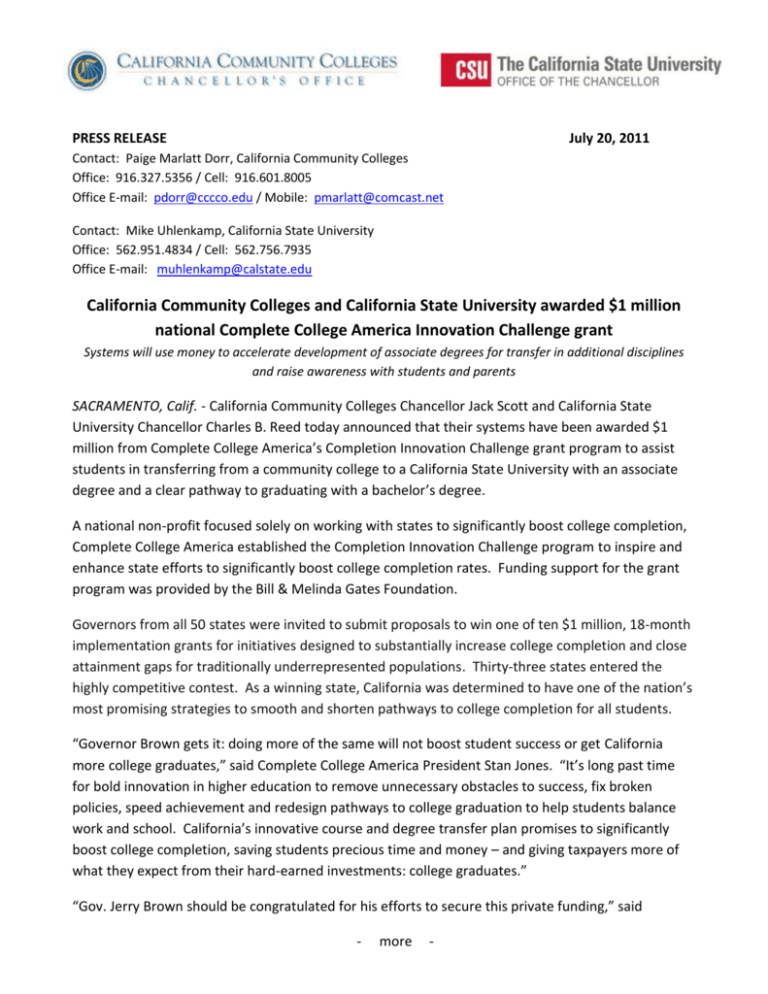
PRESS RELEASE July 20, 2011 Contact: Paige Marlatt Dorr, California Community Colleges Office: 916.327.5356 / Cell: 916.601.8005 Office E-mail: pdorr@cccco.edu / Mobile: pmarlatt@comcast.net Contact: Mike Uhlenkamp, California State University Office: 562.951.4834 / Cell: 562.756.7935 Office E-mail: muhlenkamp@calstate.edu California Community Colleges and California State University awarded $1 million national Complete College America Innovation Challenge grant Systems will use money to accelerate development of associate degrees for transfer in additional disciplines and raise awareness with students and parents SACRAMENTO, Calif. - California Community Colleges Chancellor Jack Scott and California State University Chancellor Charles B. Reed today announced that their systems have been awarded $1 million from Complete College America’s Completion Innovation Challenge grant program to assist students in transferring from a community college to a California State University with an associate degree and a clear pathway to graduating with a bachelor’s degree. A national non-profit focused solely on working with states to significantly boost college completion, Complete College America established the Completion Innovation Challenge program to inspire and enhance state efforts to significantly boost college completion rates. Funding support for the grant program was provided by the Bill & Melinda Gates Foundation. Governors from all 50 states were invited to submit proposals to win one of ten $1 million, 18-month implementation grants for initiatives designed to substantially increase college completion and close attainment gaps for traditionally underrepresented populations. Thirty-three states entered the highly competitive contest. As a winning state, California was determined to have one of the nation’s most promising strategies to smooth and shorten pathways to college completion for all students. “Governor Brown gets it: doing more of the same will not boost student success or get California more college graduates,” said Complete College America President Stan Jones. “It’s long past time for bold innovation in higher education to remove unnecessary obstacles to success, fix broken policies, speed achievement and redesign pathways to college graduation to help students balance work and school. California’s innovative course and degree transfer plan promises to significantly boost college completion, saving students precious time and money – and giving taxpayers more of what they expect from their hard-earned investments: college graduates.” “Gov. Jerry Brown should be congratulated for his efforts to secure this private funding,” said - more - 2–2–2 California Community Colleges Chancellor Jack Scott. “The grant award shows that California’s higher education systems continue to be innovative and lead the nation. With this award, our transfer degree program has received national recognition which validates that we are on the right path and confirms our model should be emulated by other states wanting to improve their graduation rates.” The grant comes as the California Community Colleges and California State University systems have been working hard to create transfer pathways as dictated by the Student Transfer Achievement Reform Act of 2010. Administration of justice/criminal justice, early childhood education, history, geology, physics and theatre were the first disciplines to go through the transfer pathway vetting process. The first degrees will be in place for students when they enroll this fall. There are now 16 model programs that have been developed in disciplines including business administration, mathematics, sociology and psychology. Currently, 53 of the 112 community colleges have successfully developed degrees in at least one of the 16 programs. Once the community college course loads have been completed in a discipline, students will graduate with an associate degree and be given junior standing and priority consideration for enrollment to any California State University that offers a similar program. After enrolled at a California State University, students in the program will be able to complete a Bachelor of Arts or Bachelor of Science degree in no more than 60 additional units. The transfer reform, authored by Sen. Alex Padilla (D-Pacoima) and signed into law in September 2010 by former Gov. Arnold Schwarzenegger, simplifies the transfer process between systems, saves students money, frees up space in classrooms and increases graduation rates. In addition, the efficiencies will generate approximately $160 million annually in cost savings that can be used to provide access to more students that are currently being turned away. The grant money will support expedited development of model curriculum in the highest volume programs. The funds also will be used to raise awareness with parents and students about the transfer degree options. “My legislation, for the first time in California history, promises community college students a clear and guaranteed pathway for admission to a CSU with junior status and an associate degree,” said Sen. Alex Padilla. “This grant will help California keep that promise. I applaud Governor Brown’s efforts to win this essential funding. This is a smart investment that will make a real difference for students.” California State University Chancellor Charles B. Reed said the collaboration he has seen between the faculties of both systems has been impressive. Like Chancellor Scott, Reed said the transfer program was much needed and the grant will help save students both time and money. “This grant money will make the approval process even faster and enable more students to transfer - more - 3–3–3 from a community college to our system,” said Chancellor Charles Reed. “The collaboration of the faculty from each system has been key to identifying the appropriate curriculum for specific majors, and students can look forward to the approval of additional transfer degrees as we move forward and apply the grant money. The end result is that students will be able to realize their goal of obtaining a four-year college degree that much sooner.” The California Community Colleges is the largest system of higher education in the nation. It is composed of 72 districts and 112 colleges serving 2.76 million students per year. Community colleges supply workforce training, basic skills courses in English and math, and prepare students for transfer to four-year colleges and universities. The Chancellor’s Office provides leadership, advocacy and support under the direction of the Board of Governors of the California Community Colleges. The California State University is the largest system of senior higher education in the country, with 23 campuses, approximately 412,000 students and 43,000 faculty and staff. The CSU awards about 90,000 degrees annually and since its creation in 1961 has conferred nearly 2.6 million. Celebrating its 50th anniversary this year, the CSU is renowned for the quality of its teaching and for the job-ready graduates it produces. The mission of the CSU is to provide high-quality, affordable education to meet the ever changing needs of the people of California. With its commitment to excellence, diversity and innovation, the CSU is the university system that is working for California. ###
